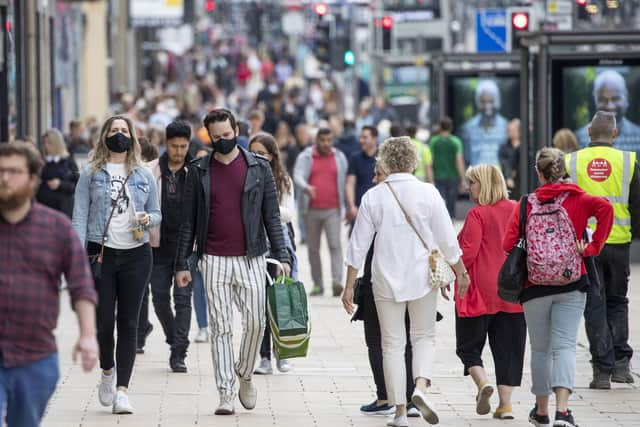Scots consumer confidence falls for first time in 2021 amid rising prices
Overall confidence in Scotland was hampered by reduced optimism around personal finances, specifically in the level of debt (down four percentage points to -3 per cent) and household disposable income (down 16 percentage points to -27 per cent), the latest Deloitte Consumer Tracker has found. This compares to -4 per cent and -21 per cent respectively at a national level.
The Tracker has been measuring UK consumer confidence on a quarterly basis for a decade, with the latest analysis based on responses from a nationally representative sample of 3,185 UK consumers between September 17 and 20, including 289 in Scotland.
Advertisement
Hide AdAdvertisement
Hide Ad

Ben Perkins, head of consumer research at Deloitte, said that while overall UK confidence remained at the same level as in the third quarter of 2019, “thus maintaining pre-pandemic confidence levels which returned last quarter, the end of furlough, removal of Universal Credit top-ups, and rising inflation have contributed to a quarterly fall for the first time this year”.
He added that 36 per cent of consumers across the UK said their overall spending had increased in the last three months, “primarily driven by rising utility bills and transport spending as more workers returned to offices”.
Deloitte said Scottish consumers were found to be more confident relative to the previous quarter regarding job security, which saw an increase of one percentage point to -5 per cent, up nine percentage points from the year-ago period.
However, these figures were slightly lower than the UK average when it came to indicators around job opportunities and career progression relative to the previous quarter, which fell by one percentage point in Scotland to -9 per cent but rose three percentage points to -4 per cent across the UK.
Additionally, the UK workforce is “significantly” smaller than it was before the pandemic began, Deloitte added. Its chief economist Ian Stewart said: “A year ago the central economic problem was excess capacity and too few jobs; now it is insufficient capacity and too many jobs. With inflation well above its 2.0 per cent target, and likely to rise further, the stage looks set for the Bank of England to raise interest rates by the end of this year.”
Positive
Simon Oaten, partner for hospitality and leisure at Deloitte, said: “Hospitality businesses across the UK have been more than twice as likely as other industries to be experiencing challenges in filling vacancies compared with normal expectations for this time of year.”
Scottish consumers tipped discretionary spending into positive territory in the third quarter, to +1 per cent, for the first time in the Tracker’s history. Strong spending was seen across almost every leisure subsector, including attending live sports events and eating out, both of which saw increases in Scotland of eight and seven percentage points respectively.
Additionally, with more consumers heading out, in-home leisure and betting and gaming expenditure both decreased from the previous quarter, in line with the rest of the UK.
Advertisement
Hide AdAdvertisement
Hide AdScottish respondents also indicated that they expect their discretionary spending in the current quarter to fall by six percentage points compared to July to September.
A message from the Editor:
Thank you for reading this article. We're more reliant on your support than ever as the shift in consumer habits brought about by coronavirus impacts our advertisers.
If you haven't already, please consider supporting our trusted, fact-checked journalism by taking out a digital subscription.
Comments
Want to join the conversation? Please or to comment on this article.
